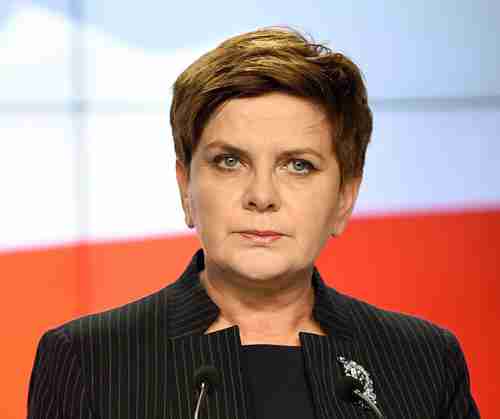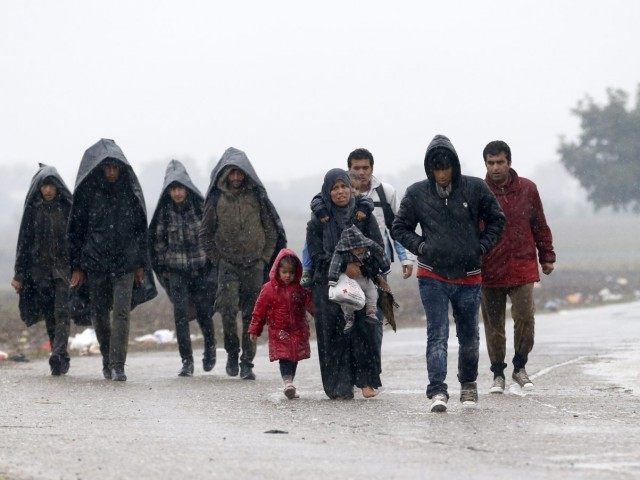This morning’s key headlines from GenerationalDynamics.com
- Eurosceptic party in Poland wins election overwhelmingly
- European Union nations in crisis agree on a migration plan for refugees
- Hey kids, what time is it? In Turkey, it’s Erdogan Time!
Eurosceptic party in Poland wins election overwhelmingly

Poland’s new Prime Minister Beata Szydlo (AFP)
Poland’s eurosceptic Law and Justice party (PiS) claimed victory on Sunday, after exit polls showed that it won 39.1% of the total, far higher than expected. This gives PiS enough seats in parliament to govern alone, without having to form a governing alliance with another party.
The party’s leader is Jaroslaw Kaczynski, who is disliked by many people in Poland, and who has led the party to defeat in recent elections. In this election, Kaczynski put up Ms. Beata Szydlo to become prime minister if PiS wins, which appears certain. Some people suspect that Szydlo will be a puppet controlled by puppetmaster Kaczynski.
Kaczynski promised to be nice to the people his party had just defeated:
We will exert law but there will be no taking of revenge. There will be no squaring of personal accounts. There will be no kicking of those who have fallen through their own fault and very rightly so.
Some of the positions of PiS are:
- Opposing joining the eurozone, adopting the euro currency.
- Claim that Muslim migrants threaten Poland’s Catholic way of life.
- Strong support for Polish citizens working in Britain.
- For Kaczynski, a distaste for Germany, whom his parents fought during WW II.
- Advocacy of strong Western opposition to Russia’s annexation of Ukraine’s Crimea peninsula. Strongly anti-Moscow.
- Strong supporter of Nato in opposing Russia.
- Far left economic policies, including taxes on business, and increases in social spending.
- Strong opposition to so-called climate change policies that would reduce their use of coal, which supplies about 90% of the country’s electricity.
PiS wants to build stronger ties with the rest of Central Europe, a bloc that Warsaw hopes to lead, in opposition to many of the policies of Western Europe. BBC and Politico (EU) and SwissInfo
European Union nations in crisis agree on a migration plan for refugees
With Europe’s refugee crisis reaching a tipping point that could be an existential threat for the European Union, an emergency meeting of the European Commission (EC) in Brussels on Sunday reached agreement.
Nearly 250,000 migrants have passed through the Balkans since mid-September, and cold weather has not slowed the surge. Croatia said 11,500 people crossed into the country Saturday; Croatia has been waving the migrants through into the tiny country of Slovenia. Slovenia has been overwhelmed, with 60,000 arriving in the last ten days.
Slovenian Prime Minister Miro Cerar said on Sunday morning:
The situation is truly serious. If we don’t deliver some immediate and concrete actions on the ground in the next days and weeks, I believe the whole European Union and Europe as a whole will start to fall apart.
The apocalyptic words were triggered by visions of thousands of migrants having to sleep on the ground in freezing weather, and hundreds dying from hypothermia at the closed border crossings.
Everyone seemed to agree that the problem could not be solved without Turkey’s help in blocking migration from Turkey to Greece, but Turkey was not represented at the meeting.
Except for that one point, the meeting was extremely contentious, with the West Europeans demanding that the Balkan states follow international law with regard to protection of refugees, and the Balkan states demanding that the EU take responsibility for the refugees.
Because temperatures are already falling below freezing at night, the EC meeting focused on getting shelter for the migrants as quickly as possible. Reception centers will be built by the end of the year in Greece and the Balkan countries, to hold 100,000 refugees. Also, the EU will send 400 police officers to Slovenia, to help with the surge of migrants.
The plan agreed to by the EC nations have the following main points:
- To increase reception capacity to 30,000 places by the end of the year in Greece. The UN refugee agency will provide rent subsidies and host family programs for at least 20,000 more people.
- To seek additional capacity of 50,000, reaching a total of 100,000 along the western Balkans route and Greece.
- To deploy 400 police officers within a week to Slovenia.
- To step up efforts to facilitate return of migrants not in need for international protection and step up cooperation on repatriation with Afghanistan, Bangladesh, Iraq and Pakistan.
- To scale up the Poseidon Sea joint operation in Greece, in particular the EU’s border agency Frontex’s presence in the Aegean Sea, and strengthen significantly Frontex support to Greece in registering and fingerprinting activities.
- To refrain from facilitating the movement of migrants to the border of another country.
- To set up contact points to allow daily exchanges of information regarding migrant movements.
- To exchange information on the size of movement and flows of refugees. Frontex [the European Union’s border protection agency] as well as the EU’s asylum office ESAO will put this exchange of information in place.
- To contact financial institutions, including the European Investment Bank and the European Bank for Reconstruction and Development, to secure finances for accommodation of refugees.
- To step up police and judicial cooperation actions against migrant smuggling, engaging Europol and Interpol in Western Balkan route operations.
- To reinforce support of the bloc’s border agency Frontex at the border between Bulgaria and Turkey. To set up a new Frontex operation at the external land borders between Greece and Macedonia and Greece and Albania to focus on exit checks and registration of refugees who were not registered in Greece.
- Working together with Frontex to detect irregular border crossing and support registration and fingerprinting in Croatia.
It is one thing to agree to a plan, and another thing to spend the money to implement it. For one thing, it is not clear to me how these reception centers will be built in time to prevent mass hypothermia. It may be that one (unstated) part of the plan is to keep as many refugees in Greece for as long as possible, since the weather is warm there. Politico (EU) and BBC and Guardian (London)
Hey kids, what time is it? In Turkey, it’s Erdogan Time!
Sunday was the day in the Eastern European Time (EET) Zone that clocks were turned back one hour, to end daylight saving time. (In North America, this change is made one week later, on November 1.)
However, Turkey is in chaos because president Recep Tayyip Erdogan has decreed that the time change will be delayed for TWO weeks in Turkey, until November 8, the first Sunday after the November 1 elections.
Apparently President Erdogan has absolutely no clue how computers work. Operating systems for almost all computers — desktops, smartphones, tablets, etc. — have been programmed for years to put Turkey into the Eastern European Time Zone, and to set the time back one hour on October 25, 2015. Erdogan’s last minute decree to put Turkey into its own special time zone and to set the time back on November 8 is not reflected in computer software, and an update would have taken weeks.
The result is mass confusion in Turkey about what time it is. According to news reports, people are already missing appointments, including Muslim prayer times.
According to one British expat:
We’re on special ‘Erdogan time’ as he decided not to implement daylight savings until after the election.
Unfortunately, while he CAN hold back time, he CAN’T hold back automatic clocks which seem to have gone ahead and changed the hour regardless. Hence we’re all very confused.
According to one Twitter user: “For the next two weeks #Turkey is on EEST… Erdogan Engineered Standard Time.”
Erdogan apparently has difficulty learning this lesson. On March 30, 2014, Turkey delayed the switch to daylight savings time by one day. Flights were delayed, and automatic baggage handling system at the İstanbul airport malfunctioned on Sunday morning when passengers started checking in due to synchronization problems. Today’s Zaman (Istanbul) and BBC and Today’s Zaman (30-Mar-2014)
KEYS: Generational Dynamics, Poland, Law and Justice party, PiS, Jaroslaw Kaczynski, Ms Beata Szydlo, Ukraine, Russia, Nato, European Commission, Croatia, Slovenia, Miro Cerar, Greece, Germany, Turkey, Aegean Sea, Recep Tayyip Erdogan, Eastern European Time, EET
Permanent web link to this article
Receive daily World View columns by e-mail

COMMENTS
Please let us know if you're having issues with commenting.